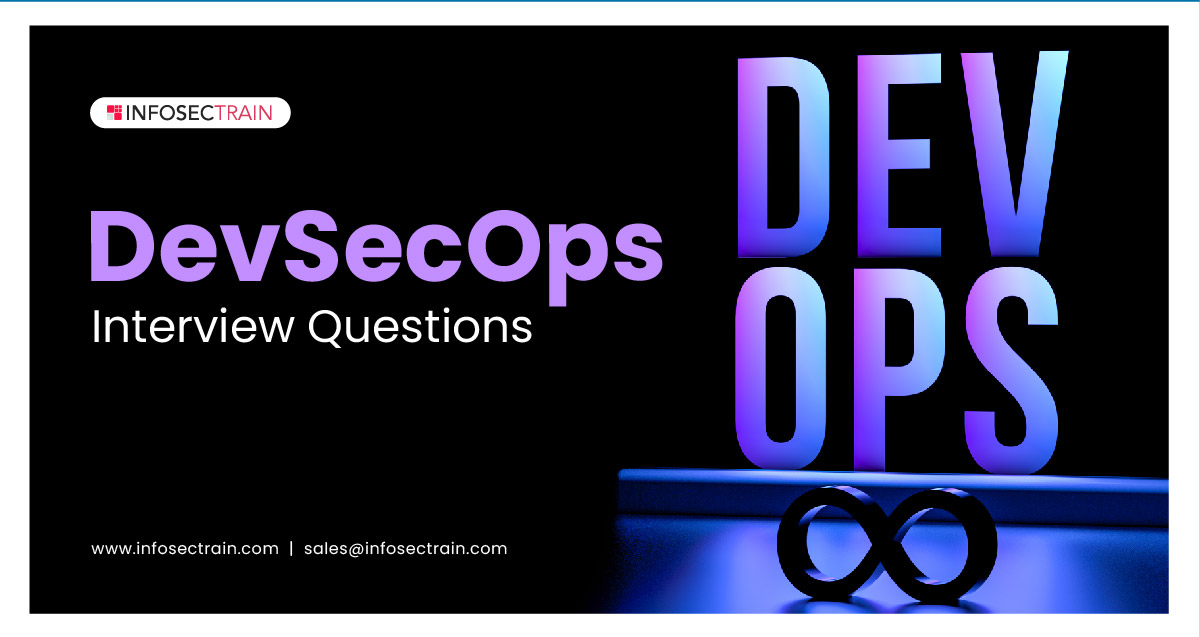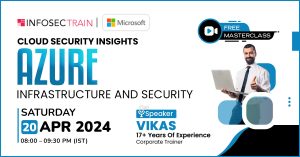DevSecOps Interview Questions
These days, many companies employ Development and Operations (DevOps) teams to assist them in developing software. However, most cutting-edge software applications fail without adequate security because development teams implement security at the end of the software development life cycle. Today, security measures are essential to the success of every project due to the rise in data breaches and cyber-attacks, yet they are not appropriately implemented. Moreover, addressing key concerns when security is involved at the end of the development process is more complex and time-consuming. Therefore, there is a demand for a new kind of hybrid role known as DevSecOps that assists businesses in integrating security across software development by putting security controls in place at each stage of the development life cycle. If you are considering a DevSecOps role, you may expect to be questioned about your security and development experience. In this article, we will give you the most frequently asked DevSecOps interview questions and answers.

DevSecOps Interview Questions and Answers
1. What are the primary components of DevSecOps?
The following are the primary components of DevSecOps:
- Application/API inventory
- Compliance monitoring
- Cultural factors
- Custom Code Security (CCS)
- Open Source Security (OSS)
- Runtime prevention
2. Name some of the most widely used DevOps tools.
Following are a few of the most widely used DevOps tools:
- Ansible
- Puppet
- Chef
- Splunk
- Docker
- Git
- Jenkins
- Nagios
- Kubernetes (K8s)
- Selenium
3. What is the distinction between DevOps and DevSecOps?
DevOps is a collection of practices that aims to integrate IT operations and software development. DevOps helps organizations to improve their efficiency by coding, testing, and deploying code on production servers while mitigating risk at every phase.
DevSecOps is a collection of principles and practices that integrate security into each Software Development Life Cycle (SDLC) phase. DevSecOps helps organizations protect their data, applications, infrastructure, and software.
4. What are the advantages of a DevSecOps Maturity Model?
The following are the advantages of a DevSecOps Maturity Model:
- Reduced complexity and costs
- Emphasize security at every step of the software development process
- Enhanced security posture
- Fast security vulnerability patching
- Enhance collaboration and communication between development and security teams
5. What types of application security tools are used in the DevSecOps process?
To successfully implement DevSecOps, companies should consider several Application Security Testing (AST) tools.
- Static Application Security Testing (SAST): SAST tools performs a security vulnerability analysis on the development source code and fixes any issues before moving on to the next stage of the SDLC.
- Dynamic Application Security Testing (DAST): DAST tools analyze active web applications to identify vulnerabilities through simulated attacks. It includes black box testing techniques like fuzz testing.
- Interactive Application Security Testing (IAST): IAST tools analyze the source code for security vulnerabilities in execution while an application is being tested manually or automatically in the background.
- Software Composition Analysis (SCA): SCA tools analyze source code and binaries to identify known vulnerabilities in open-source libraries and third-party components.
6. What are the responsibilities of a DevOps/DevSecOps architect?
DevOps/DevSecOps architects have the following responsibilities:
- Check for vulnerabilities in a system by testing and monitoring it
- Maintain the security and safety of the organization’s data, network, and IT infrastructure through monitoring, coding, testing, and communication
- Describe the architecture of the continuous delivery pipeline
- Manage and review technical operations
- Create and implement self-service provisioning solutions
- Establish configuration management methods
- Collaborate with the operations team and developers to simplify the application delivery process
- Create continuous build environments to accelerate software development
- Monitor and control cloud infrastructure deployments
7. What metrics would you employ to evaluate DevOps performance?
The following metrics are used to measure DevOps performance:
- Lead time for changes
- Mean Time to Change (MTTC)
- Mean Time to Recovery (MTTR)
- Mean Time to Incident (MTTI)
- Change failure rate
- Cycle time
- Change volume
- Defect escape rate
- Deployment frequency
8. What are the advantages of including automation in our SDLC process’ testing phase?
Incorporating automation into the testing phase of the SDLC process comes with a number of potential advantages. Some of them are:
- Reduced expenses
- Enables Reusability
- Increased accuracy and consistency
- Accelerate testing process
- Strengthen communication between developers and testers
9. What do you know about container security?
Container security protects a container’s infrastructure, software supply chain, system tools, system libraries, and runtime, as well as its application and performance, from potential cybersecurity risks using security tools and policies.
10. What are the essential elements that create tools for continuous testing?
Primary components that are used to create tools for continuous testing include:
- Risk Assessment: This includes risk mitigation activities, test coverage optimization, and quality assessment to ensure the build is prepared to advance to the next phase.
- Policy Analysis: It ensures that all procedures comply with the organization’s business needs.
- Requirements Traceability: It ensures requirements tracking during the entire product development process. It helps minimize the risk of adverse outcomes and maximize productivity.
- Advanced Analysis: It uses automation to perform static code analysis, change impact analysis, and scope assessment to prevent errors before they occur.
- Test Optimization: It ensures that tests provide accurate results and give useful information. Some factors include test data management, test optimization management, and test maintenance.
11. How do you begin a DevSecOps project?
To start DevOps or DevSecOps projects in the company, you will need to go through a number of phases, such as assessment, gap analysis, maturity model, project implementation roadmap, and so on.
12. What are the DevOps anti-patterns?
Patterns are standard procedures that companies regularly follow. When a company keeps adhering to a pattern that others have adopted but does not suit their needs, it creates an anti-pattern. The following are a few DevOps anti-patterns:
- Unable to perform DevOps → Have the wrong personnel
- DevOps ⇒ Developers perform production management
- The solution to all the company’s issues ⇒ DevOps
- DevOps == Agile
- DevOps == Process
- Unable to perform DevOps → Organization is unique
- We need a separate DevOps group
13. What is continuous testing?
Continuous testing is a kind of software testing where the application is assessed frequently and initiated throughout the Continuous Delivery (CD) process. This testing uses automated tests to ensure that DevSecOps teams receive timely feedback and quickly minimize risks throughout SDLC.
14. What are the advantages of continuous testing in DevSecOps?
The following are the advantages of continuous testing in DevSecOps:
- Identify the errors prior to being released to production.
- Accelerate the rate of release
- Conduct performance tests in parallel to boost the overall speed of the testing
- Evaluate the possibility of issues before they turn into actual issues
- Reduce testing time by automating your test cases
15. What are the essential components of continuous testing?
Essential components of continuous testing include:
- Test automation
- Continuous Integration (CI)
- Continuous Delivery (CD)
16. What is “IaC”? How does it connect to the DevOps methodology?
IaC stands for Infrastructure as Code. It is an approach to manage and provision system data centers using machine-readable specification files instead of physically installing hardware. It is frequently used in conjunction with the DevOps methodology to provide an automated and simplified infrastructure management approach.
17. What does “Mean-Time-To-Recovery” mean?
Mean-Time-To-Recovery (MTTR) is a metric that measures how quickly issues can be resolved. It is used to evaluate the performance of DevOps projects by comparing the pre-and post-DevOps MTTR data.
18. What stage of DevOps should security be integrated into?
Security should be integrated into every stage of the DevOps lifecycle, including conceptualization, design, development, test, maintenance, release, and support.
19. What are DevOps’ primary activities with application development?
The primary activities of DevOps with application development are:
- Code building
- Code coverage
- Unit testing
- Packaging
- Deployment
20. What are DevOps’ primary activities with infrastructure?
The primary activities of DevOps with infrastructure are:
- Provisioning
- Configuration
- Orchestration
- Deployment
How can InfosecTrain help?
In the domain of DevSecOps, there are lots of job opportunities. To pursue a successful career in this domain, you must possess a solid understanding of DevSecOps’ foundational concepts and be well-prepared for interviews. By considering these interview questions, we hope you can successfully prepare for your DevSecOps interview and acquire a satisfying opportunity in the industry. We at InfosecTrain are ready and eager to assist you in meeting your professional goals if you require expert advice and strategic direction for your preparation. You are welcome to enroll for our AZ- 400 Microsoft Certified: Azure DevOps Engineer Expert certification training course.




 1800-843-7890 (India)
1800-843-7890 (India) 
